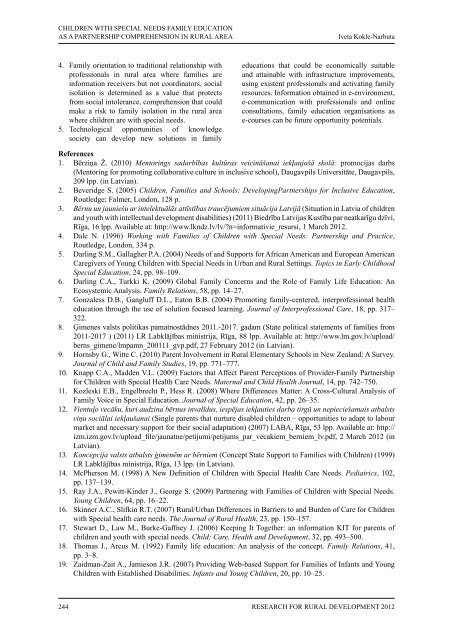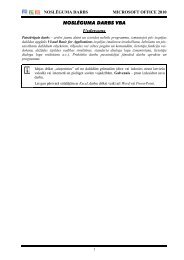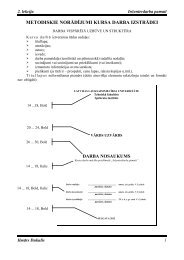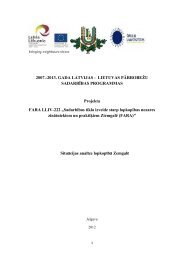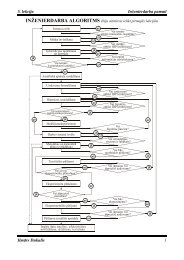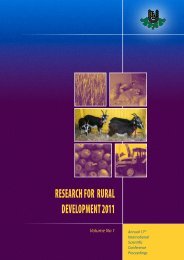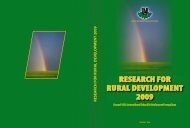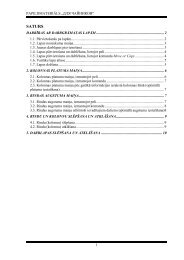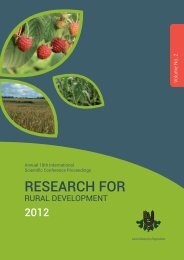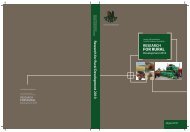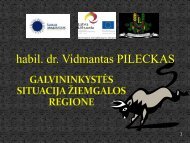LATVIA UNIVERSITY OF AGRICULTURE - Latvijas ...
LATVIA UNIVERSITY OF AGRICULTURE - Latvijas ...
LATVIA UNIVERSITY OF AGRICULTURE - Latvijas ...
- No tags were found...
You also want an ePaper? Increase the reach of your titles
YUMPU automatically turns print PDFs into web optimized ePapers that Google loves.
CHILDREN WITH SPECIAL NEEDS FAMILY EDUCATIONAS A PARTNERSHIP COMPREHENSION IN RURAL AREAIveta Kokle-Narbuta4. Family orientation to traditional relationship withprofessionals in rural area where families areinformation receivers but not coordinators, socialisolation is determined as a value that protectsfrom social intolerance, comprehension that couldmake a risk to family isolation in the rural areawhere children are with special needs.5. Technological opportunities of knowledgesociety can develop new solutions in familyeducations that could be economically suitableand attainable with infrastructure improvements,using existent professionals and activating familyresources. Information obtained in e-environment,e-communication with professionals and onlineconsultations, family education organisations ase-courses can be future opportunity potentials.References1. Bērziņa Ž. (2010) Mentorings sadarbības kultūras veicināšanai iekļaujošā skolā: promocijas darbs(Mentoring for promoting collaborative culture in inclusive school), Daugavpils Universitāte, Daugavpils,209 lpp. (in Latvian).2. Beveridge S. (2005) Children, Families and Schools: DevelopingPartnerships for Inclusive Education,Routledge; Falmer, London, 128 p.3. Bērnu un jauniešu ar intelektuālās attīstības traucējumiem situācija Latvijā (Situation in Latvia of childrenand youth with intellectual development disabilities) (2011) Biedrība <strong>Latvijas</strong> Kustība par neatkarīgu dzīvi,Rīga, 16 lpp. Available at: http://www.lkndz.lv/lv/?n=informativie_resursi, 1 March 2012.4. Dale N. (1996) Working with Families of Children with Special Needs: Partnership and Practice,Routledge, London, 334 p.5. Darling S.M., Gallagher P.A. (2004) Needs of and Supports for African American and European AmericanCaregivers of Young Children with Special Needs in Urban and Rural Settings. Topics in Early ChildhoodSpecial Education, 24, pp. 98–109.6. Darling C.A., Turkki K. (2009) Global Family Concerns and the Role of Family Life Education: AnEcosystemic Analysis. Family Relations, 58, pp. 14–27.7. Gonzaless D.B., Gangluff D.L., Eaton B.B. (2004) Promoting family-centered, interprofessional healtheducation through the use of solution focused learning. Journal of Interprofessional Care, 18, pp. 317–322.8. Ģimenes valsts politikas pamatnostādnes 2011.-2017. gadam (State political statements of families from2011-2017 ) (2011) LR Labklājības ministrija, Rīga, 88 lpp. Available at: http://www.lm.gov.lv/upload/berns_gimene/lmpamn_200111_gvp.pdf, 27 February 2012 (in Latvian).9. Hornsby G., Witte C. (2010) Parent Involvement in Rural Elementary Schools in New Zealand: A Survey.Journal of Child and Family Studies, 19, pp. 771–777.10. Knapp C.A., Madden V.L. (2009) Factors that Affect Parent Perceptions of Provider-Family Partnershipfor Children with Special Health Care Needs. Maternal and Child Health Journal, 14, pp. 742–750.11. Kozleski E.B., Engelbrecht P., Hess R. (2008) Where Differences Matter: A Cross-Cultural Analysis ofFamily Voice in Special Education. Journal of Special Education, 42, pp. 26–35.12. Vientuļo vecāku, kuri audzina bērnus invalīdus, iespējas iekļauties darba tirgū un nepieciešamais atbalstsviņu sociālai iekļaušanai (Single parents that nurture disabled children – opportunities to adapt to labourmarket and necessary support for their social adaptation) (2007) LABA, Rīga, 53 lpp. Available at: http://izm.izm.gov.lv/upload_file/jaunatne/petijumi/petijums_par_vecakiem_berniem_lv.pdf, 2 March 2012 (inLatvian).13. Koncepcija valsts atbalsts ģimenēm ar bērniem (Concept State Support to Families with Children) (1999)LR Labklājības ministrija, Rīga, 13 lpp. (in Latvian).14. McPherson M. (1998) A New Definition of Children with Special Health Care Needs. Pediatrics, 102,pp. 137–139.15. Ray J.A., Pewitt-Kinder J., George S. (2009) Partnering with Families of Children with Special Needs.Young Children, 64, pp. 16–22.16. Skinner A.C., Slifkin R.T. (2007) Rural/Urban Differences in Barriers to and Burden of Care for Childrenwith Special health care needs. The Journal of Rural Health, 23, pp. 150–157.17. Stewart D., Law M., Burke-Gaffney J. (2006) Keeping It Together: an information KIT for parents ofchildren and youth with special needs. Child: Care, Health and Development, 32, pp. 493–500.18. Thomas J., Arcus M. (1992) Family life education: An analysis of the concept. Family Relations, 41,pp. 3–8.19. Zaidman-Zait A., Jamieson J.R. (2007) Providing Web-based Support for Families of Infants and YoungChildren with Established Disabilities. Infants and Young Children, 20, pp. 10–25.244 Research for Rural Development 2012


